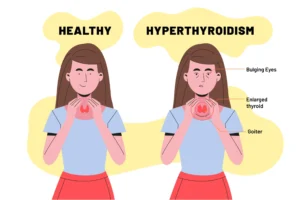 Hypothyroidism, or underactive thyroid, is a common thyroid disorder characterized by inadequate production of thyroid hormones by the thyroid gland.
Hypothyroidism, or underactive thyroid, is a common thyroid disorder characterized by inadequate production of thyroid hormones by the thyroid gland.
Understanding the symptoms, causes, and the role of diet in managing hypothyroidism is essential for individuals diagnosed with this condition.
Today, we’ll explore the key aspects of hypothyroidism and discuss the best diet for managing its symptoms.
Symptoms of Hypothyroidism
- Fatigue and Weakness. Individuals with hypothyroidism often experience persistent fatigue and weakness, even after getting adequate rest.
- Weight Gain. Unexplained weight gain or difficulty losing weight despite a healthy diet and regular exercise can be a common symptom of hypothyroidism.
- Cold Sensitivity. Hypothyroidism can cause intolerance to cold temperatures, with affected individuals feeling cold more easily than others.
- Dry Skin and Hair. Dry, rough skin and brittle hair that is prone to breakage are common symptoms of hypothyroidism due to decreased thyroid hormone levels affecting skin and hair health.
Causes of Hypothyroidism
- Autoimmune Thyroiditis (Hashimoto’s Thyroiditis). The most common cause of hypothyroidism is autoimmune thyroiditis, where the body’s immune system mistakenly attacks the thyroid gland, leading to inflammation and decreased hormone production.
- Thyroid Surgery or Radioactive Iodine Treatment. Surgical removal of the thyroid gland or treatment with radioactive iodine for thyroid conditions can result in hypothyroidism if not enough thyroid tissue remains to produce adequate hormone levels.
- Iodine Deficiency. In regions with iodine deficiency, inadequate intake of this essential mineral can lead to hypothyroidism due to the thyroid’s inability to produce sufficient hormones without an adequate supply of iodine.
- Medications. Certain medications, such as lithium, amiodarone, and some anti-thyroid drugs, can interfere with thyroid hormone production and contribute to hypothyroidism.
Best Diet for Hypothyroidism
- Iodine-Rich Foods. Including iodine-rich foods in the diet, such as iodized salt, seafood, dairy products, and seaweed, can help ensure an adequate supply of iodine for thyroid hormone synthesis.
- Lean Protein Sources. Incorporating lean protein sources like poultry, fish, tofu, and legumes into meals can support metabolism and help maintain muscle mass, which may be beneficial for individuals with hypothyroidism.
- Foods High in Selenium. Selenium is essential for thyroid hormone metabolism and function. Consuming selenium-rich foods like Brazil nuts, fish, whole grains, and eggs can support thyroid health.
- Limit Goitrogenic Foods. Some foods contain compounds known as goitrogens that can interfere with thyroid function. Examples include cruciferous vegetables like broccoli, cabbage, and Brussels sprouts.
Hypothyroidism is a common thyroid disorder characterized by inadequate thyroid hormone production. By understanding its symptoms, causes, and the role of diet in managing the condition, individuals can take proactive steps to support thyroid health and alleviate symptoms associated with hypothyroidism.
If you suspect you may have hypothyroidism, consult a healthcare professional for diagnosis and personalized treatment recommendations.
Picture Credit: Freepik
